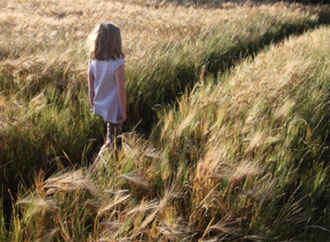华兹华斯经典诗歌代表作含词句讲解:孤独的割麦女(双语)

华兹华斯生于英格兰西北部湖区一律师家庭,八岁时离家求学,爱好大自然和诗歌。1787年进剑桥大学。1790年暑期徒步游历法国、瑞士、意大利。1791年毕业后徒步漫游了威尔士。他曾多次到苏格兰各地游历,广泛接触大自然和乡村风土民情。这首诗据说就是他游历时的收获;另一种说法认为是诗人读了朋友哈金森的一则日记后写的。哈金森在日记中写道,在一次远足中,他偶然看到一位苏格兰高地农家女在麦田里一面劳作,一面唱歌。歌声悠扬哀婉,凄切动人。这些材料经过诗人点化,成了这首脍炙人口的抒情诗。
the solitary reaper 孤独的割麦女 中英对照
behold her, single in the field, 看,一个孤独的高原姑娘,
yon solitary highland lass! 在远远的田野间收割,
reaping and singing by herself; 一边割一边独自歌唱,
stop here, or gently pass! 请你站住.或者俏悄走过!
alone she cuts and binds the grain, 她独自把麦子割了又捆,
and sings a melancholy strain; 唱出无限悲凉的歌声,
o listen! for the vale profound 屏息听吧!深广的谷地
is overflowing with the sound. 已被歌声涨满而漫溢!
no nightingale did ever chaunt 还从未有过夜莺百啭,
more welcome notes to weary bands 唱出过如此迷人的歌,
of travellers in some shady haunt, 在沙漠中的绿荫间
among arabian sands: 抚慰过疲惫的旅客;
a voice so thrilling ne'er was heard 还从未有过杜鹃迎春,
in spring-time from the cuckoo-bird, 声声啼得如此震动灵魂,
breaking the silence of the seas 在遥远的赫布利底群岛
among the farthest hebrides. 打破过大海的寂寥。
will no one tell me what she sings?-- 她唱什么,谁能告诉我?
perhaps the plaintive numbers flow 忧伤的音符不断流涌,
for old, unhappy, far-off things, 是把遥远的不聿诉说?
and battles long ago: 是把古代的战争吟咏?
or is it some more humble lay, 也许她的歌比较卑谦
familiar matter of to-day? 只是唱今日平凡的悲欢
some natural sorrow, loss, or pain, 只是唱自然的哀伤苦痛——
that has been, and may be again? 昨天经受过,明天又将重逢?
whate'er the theme, the maiden sang 姑娘唱什么,我猜不着,
as if her song could have no ending; 她的歌如流水永无尽头;
i saw her singing at her work, 只见她一边唱一边干活,
and o'er the sickle bending; ―― 弯腰挥镰,操劳不休……
i listen'd, motionless and still; 我凝神不动,听她歌唱,
and, as i mounted up the hill, 然后,当我登上了山岗,
the music in my heart i bore, 尽管歌声早已不能听到,
long after it was heard no more. 它却仍在我心头缭绕。
重点词句注释
1) behold: 古代诗歌用法,相当于今日的look,古英语诗歌的hark相当于今日的listen;但意思上则更加古雅。
2) yon=yonder, over there
3) lass少女,也是多用于古代诗歌,对应的是lad(少年)
4) melancholy strain,这里strain相当于tone,说明歌唱的曲调是忧伤的
5) vale profound .vale=valley,古代诗歌用法, profound, 悠长的山谷
6) chaunt, 即chant, 歌唱
7) welcome notes. pleasing and pleasant songs
8) shady haunt, dark and horrible places
9) arabian sands. arabian deserts
10) thrilling歌声的感染力
11) hebrides: 苏格兰最北部的一片群岛
12) plaintive numbers: 倾诉的歌声,numbers-歌声,旋律
13) humble lay 朴素平常的小调
14) familiar matter of to-day?
15) sickle 英国农村常用的大割镰

华兹华斯生于英格兰西北部湖区一律师家庭,八岁时离家求学,爱好大自然和诗歌。1787年进剑桥大学。1790年暑期徒步游历法国、瑞士、意大利。1791年毕业后徒步漫游了威尔士。他曾多次到苏格兰各地游历,广泛接触大自然和乡村风土民情。这首诗据说就是他游历时的收获;另一种说法认为是诗人读了朋友哈金森的一则日记后写的。哈金森在日记中写道,在一次远足中,他偶然看到一位苏格兰高地农家女在麦田里一面劳作,一面唱歌。歌声悠扬哀婉,凄切动人。这些材料经过诗人点化,成了这首脍炙人口的抒情诗。
the solitary reaper 孤独的割麦女 中英对照
behold her, single in the field, 看,一个孤独的高原姑娘,
yon solitary highland lass! 在远远的田野间收割,
reaping and singing by herself; 一边割一边独自歌唱,
stop here, or gently pass! 请你站住.或者俏悄走过!
alone she cuts and binds the grain, 她独自把麦子割了又捆,
and sings a melancholy strain; 唱出无限悲凉的歌声,
o listen! for the vale profound 屏息听吧!深广的谷地
is overflowing with the sound. 已被歌声涨满而漫溢!
no nightingale did ever chaunt 还从未有过夜莺百啭,
more welcome notes to weary bands 唱出过如此迷人的歌,
of travellers in some shady haunt, 在沙漠中的绿荫间
among arabian sands: 抚慰过疲惫的旅客;
a voice so thrilling ne'er was heard 还从未有过杜鹃迎春,
in spring-time from the cuckoo-bird, 声声啼得如此震动灵魂,
breaking the silence of the seas 在遥远的赫布利底群岛
among the farthest hebrides. 打破过大海的寂寥。
will no one tell me what she sings?-- 她唱什么,谁能告诉我?
perhaps the plaintive numbers flow 忧伤的音符不断流涌,
for old, unhappy, far-off things, 是把遥远的不聿诉说?
and battles long ago: 是把古代的战争吟咏?
or is it some more humble lay, 也许她的歌比较卑谦
familiar matter of to-day? 只是唱今日平凡的悲欢
some natural sorrow, loss, or pain, 只是唱自然的哀伤苦痛——
that has been, and may be again? 昨天经受过,明天又将重逢?
whate'er the theme, the maiden sang 姑娘唱什么,我猜不着,
as if her song could have no ending; 她的歌如流水永无尽头;
i saw her singing at her work, 只见她一边唱一边干活,
and o'er the sickle bending; ―― 弯腰挥镰,操劳不休……
i listen'd, motionless and still; 我凝神不动,听她歌唱,
and, as i mounted up the hill, 然后,当我登上了山岗,
the music in my heart i bore, 尽管歌声早已不能听到,
long after it was heard no more. 它却仍在我心头缭绕。
重点词句注释
1) behold: 古代诗歌用法,相当于今日的look,古英语诗歌的hark相当于今日的listen;但意思上则更加古雅。
3) lass少女,也是多用于古代诗歌,对应的是lad(少年)
4) melancholy strain,这里strain相当于tone,说明歌唱的曲调是忧伤的
5) vale profound .vale=valley,古代诗歌用法, profound, 悠长的山谷
6) chaunt, 即chant, 歌唱
10) thrilling歌声的感染力
11) hebrides: 苏格兰最北部的一片群岛
12) plaintive numbers: 倾诉的歌声,numbers-歌声,旋律
13) humble lay 朴素平常的小调
15) sickle 英国农村常用的大割镰
2) yon=yonder, over there
7) welcome notes. pleasing and pleasant songs
8) shady haunt, dark and horrible places
9) arabian sands. arabian deserts
14) familiar matter of to-day?
 九年级下册英语书
九年级下册英语书 九年级全册英语书
九年级全册英语书 高二必修4英语书
高二必修4英语书 高三必修5英语书
高三必修5英语书 八年级上册英语书
八年级上册英语书 七年级上册英语书
七年级上册英语书